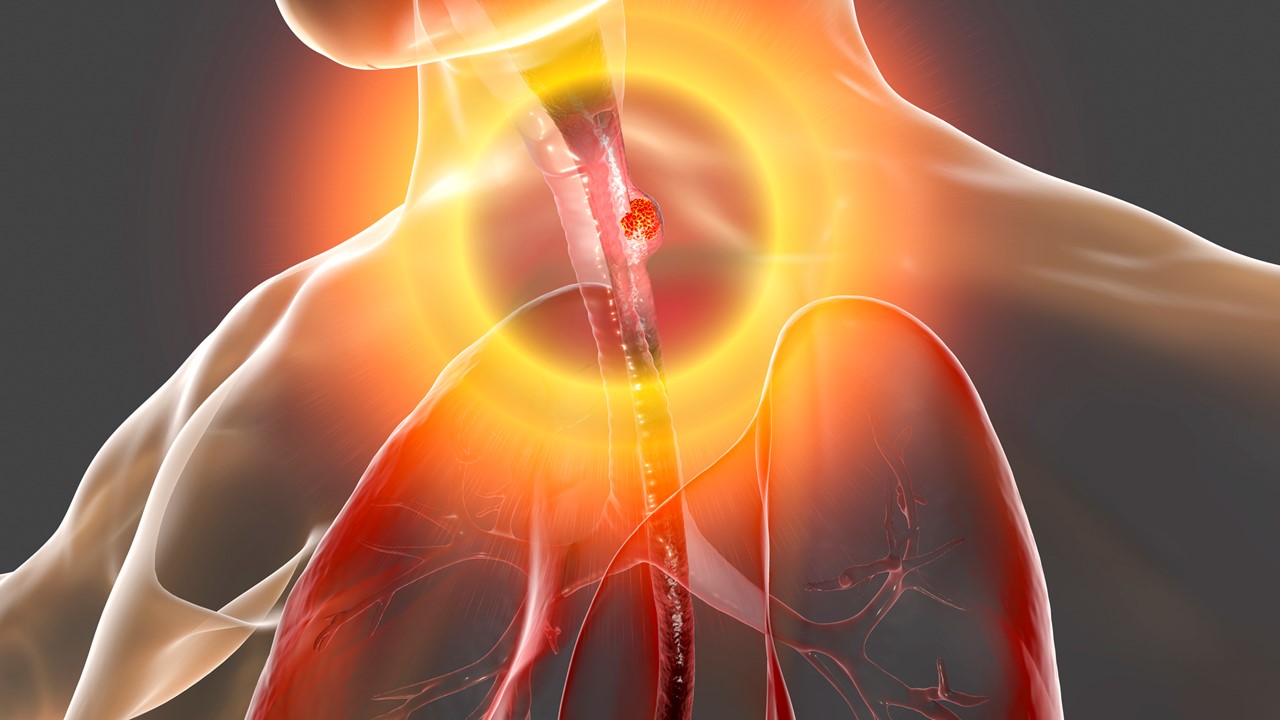
In a small but rigorous pilot study, Johns Hopkins Medicine researchers have shown that a novel, minimally invasive biomarker-based strategy they developed was 90% successful in detecting esophageal squamous cell carcinoma (ESCC), the predominant subtype of esophageal cancer worldwide.
Although less common than some other tumor types in the United States, esophageal cancer remains the sixth-most common cause of cancer death worldwide, claiming the lives of more than half a million people annually, especially in low- to moderate-income countries in Africa, Asia and other continents. Early detection of this deadly disease greatly improves survival, but by the time symptoms — such as trouble swallowing, weight loss, anemia or bleeding — become apparent, it’s often too late to cure.
The new case-control study combining a swallowable, retrievable device with molecular biomarkers is described in an April 26 Research Letter published in the high-impact journal, Gastroenterology.
In the article, gastroenterologist Stephen Meltzer, M.D., the Myerberg-Hendrix and American Cancer Society Professor of Medicine and Oncology at the Johns Hopkins University School of Medicine, said the strategy combines sensitive, specific DNA-based biomarkers with a device consisting of a small gelatin capsule housing a soft sponge attached to a flexible string that can be swallowed. After a few minutes, the capsule dissolves in the stomach, releasing a sponge that’s 2 centimeters in diameter — about the size of a nickel. As the person administering the capsule pulls the sponge out by the string, it travels upward, collecting cells that line the surface of the patient’s esophagus.
“With esophageal cancer, diagnosis is a matter of life and death,” says Meltzer, who has dedicated decades of his career to the detection and prevention of this disease. “Currently, there is no inexpensive, minimally invasive screening tool that can be used regularly to diagnose those at risk, including people above age 45 with chronic severe acid reflux disease and those who smoke tobacco, inhale wood smoke (as in some low-income countries), use alcohol or are obese.”
In the newly reported case-control study, Meltzer’s research team administered the test to 94 people — including many in Uganda (a nation with a high-risk population) as well as patients at The Johns Hopkins Hospital. A standard value metric commonly used to indicate accuracy in biomarker research is something called Area Under the Curve (AUC). In this study, the three-biomarker gene algorithm used to detect ESCC (cg20655070, SLC35F1, ZNF132), including age as a fourth parameter, yielded an AUC of 0.94, which is generally considered very strong in biomarker research studies. In a totally independent, subsequently collected test set of patients collected after the biomarker model was constructed, the algorithm successfully classified 90% of patients, with a specificity of 0.87 and a sensitivity (what proportion of people with the disease the test detects) of 0.92. After the test procedure, there was no evidence of bleeding, pain, trauma or other severe adverse reactions among participants.
ESCC comprises 80% of esophageal cancers globally, with particularly high rates in Asia and southeastern Africa. Currently, people suspected of having esophageal cancer undergo endoscopies and biopsies, which are very expensive, risky and often unavailable in developing countries, where the risk for the disease is highest.
“These findings have global implications, with perhaps the biggest impact on lower-income countries with limited access to health care and resources,” says Meltzer. “We’re talking about possibly saving thousands of lives if we’re able to detect the disease early enough to intervene.”
Meltzer is co-founder of Capsulomics, Inc., which hopes to soon bring to market minimally invasive biomarker tests for the diagnosis and prognosis of both types of esophageal cancer and its premalignant precursor condition, Barrett’s esophagus.
It’s estimated that 20,640 new esophageal cancer cases will be diagnosed in the United States in 2022, according to the American Cancer Society. Notably, the five-year survival rate for this cancer is less than 20%. Recent data also demonstrate that esophageal cancer incidence is rapidly rising.
Meltzer says these preliminary results suggest that larger screening trials should be conducted in high-risk populations around the world.
Additional authors of the study include Ke Ma, Andrew Kalra, Hua-Ling Tsai and Yulan Cheng of the Johns Hopkins University School of Medicine in Baltimore, Maryland; Samson Okello from the Mbarara University of Science and Technology in Mbarara, Uganda; and a group of authors forming the Esophageal Squamous Cell Cancer Consortium, including Johns Hopkins investigators Saowanee Ngamguengphong, Eun Ji Shin, Mouen A. Khashab, Vikesh K. Singh, Robert C. Bollinger, Josephine Feliciano, Vincent K. Lam, Richard Battafarano, Michelle Turner, Peggy Lang, and Kristen A. Marrone.
This work was supported by grants from the National Institutes of Health (CA211457, K43TW010715).
Meltzer is a founder of and holds equity in Capsulomics, Inc. The Johns Hopkins University School of Medicine also owns equity in Capsulomics. Ke Ma and Yulan Cheng are co-inventors of technology licensed to Capsulomics, Inc. Ke Ma also owns equity in Capsulomics.
No other conflicts of interest to report.
